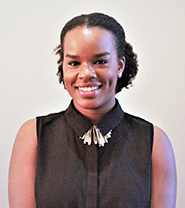Meet the New AHA Staff Member: Melody Stringer

Meet the AHA’s new Member Services Associate, Melody Stringer!
TheHumanist.com: What is your educational and work background?
I graduated from Pennsylvania State University with a BA in philosophy, focused in the humanities and arts. I also minored in gender studies. After graduation I spent some time working for a market research firm and also worked as a part-time sales manager.
I was born and raised in central Pennsylvania, so naturally I decided that I wanted to start a career elsewhere. My job search kept bringing me back to Washington, DC, because of the abundance of nonprofit opportunities. Eventually I landed a sales supervisor position in DC , but continued to look for nonprofit work.
TheHumanist.com: How did you first learn about humanism?
 I’d say my first glimpse of humanism was in a religious studies course I took in college. The class was an overview of world religions. Specifically, and maybe ironically, the Hindu philosophy of Brahman is what made me realize that I could lead an ethical life without the typical theistic influence. It basically claims that all things are interdependent, and thus I became more aware of my ethical and moral conduct. This gave me an alternative to my Christian upbringing. About a year later I came across the actual term “humanist” and found that it perfectly encompassed my values.
I’d say my first glimpse of humanism was in a religious studies course I took in college. The class was an overview of world religions. Specifically, and maybe ironically, the Hindu philosophy of Brahman is what made me realize that I could lead an ethical life without the typical theistic influence. It basically claims that all things are interdependent, and thus I became more aware of my ethical and moral conduct. This gave me an alternative to my Christian upbringing. About a year later I came across the actual term “humanist” and found that it perfectly encompassed my values.
TheHumanist.com: Did you grow up in a traditional religious faith? How did it impact you?
I was raised in a non-denominational Christian household. I went to church every Sunday and hardly questioned anything. I didn’t realize how much it impacted my ability to think for myself and come to rational conclusions until I got to college. I started having conversations with people who held other worldviews and could not wrap my mind around why they believed differently.
Everything started to change when I took that class on world religions. I began to think that all religions had a grain of truth, that they were just different interpretations of the same reality. My Christian upbringing was no longer the pinnacle of truth. I became deeply interested in East Asian philosophical religions like Buddhism and Taoism, as they rely more on spirituality and self-discovery and less on rigid dogma.
With this personal shift in religion coupled with classes in critical thinking and logic, I was well on my way to the conclusion that not only did I not need a god to live a good life, but there’s no discernable evidence that such a thing exists.
TheHumanist.com: What interested you most about working for AHA?
I’m working for an association with which I wholeheartedly share values. I think it’s quite powerful to work in a place that is openly secular and progressive, especially given the political climate. Not to mention—my upbringing and the stronghold that religion has had on the black community is a unique and empowering juxtaposition.
TheHumanist.com: What book has influenced you the most?
It’s not necessarily a book, but The Land Ethic by Aldo Leopold is an essay that was instrumental in shifting my worldview. It teaches us that we have a moral responsibility to the natural world, and to act accordingly in a way that mutually benefits all. Beyond humans, Leopold urges us to do away with anthropocentrism and see the entire natural world as one community. This helped me foster the values that eventually led me to humanism.
TheHumanist.com: If you could have dinner with any three people in the world, who would they be and why?
Lao Tzu because of my love for East Asian philosophy, my paternal grandfather because he left such a great legacy for my family (and I wasn’t fortunate enough to meet him), and Neil deGrasse Tyson for his wit and genuine awe of the cosmos.
